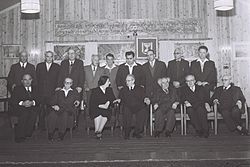Sixth Ben-Gurion Cabinet | |
|---|---|
| 8th Cabinet of Israel | |
 | |
| Date formed | 7 January 1958 |
| Date dissolved | 17 December 1959 |
| People and organisations | |
| Head of state | Yitzhak Ben-Zvi |
| Head of government | David Ben-Gurion |
| Member parties | Mapai Mapam Ahdut HaAvoda Progressive Party National Religious Party Democratic List for Israeli Arabs Progress and Work Agriculture and Development |
| Status in legislature | Coalition |
| Opposition leader | Menachem Begin |
| History | |
| Legislature term | 3rd Knesset |
| Predecessor | 7th cabinet of Israel |
| Successor | 9th cabinet of Israel |

The eighth government of Israel was formed by David Ben-Gurion on 7 January 1958, and was the second government of the third Knesset. Ben-Gurion kept the same coalition partners as during the previous government, i.e. Mapai, the National Religious Party, Mapam, Ahdut HaAvoda, the Progressive Party, the Democratic List for Israeli Arabs, Progress and Work and Agriculture and Development. The only change to the cabinet was the addition of Shlomo-Yisrael Ben-Meir as a Deputy Minister.
Contents
All ministers and deputy ministers from the National Religious Party left the cabinet on 1 July 1958.
The government collapsed following Ben-Gurion's resignation on 5 July 1959 after Ahdut HaAvoda and Mapam voted against the government during a vote on selling arms to West Germany and then refused to resign from the government. New elections were called in November that year after Ben-Gurion told President Yitzhak Ben-Zvi that he was unable to form a new government. [1]